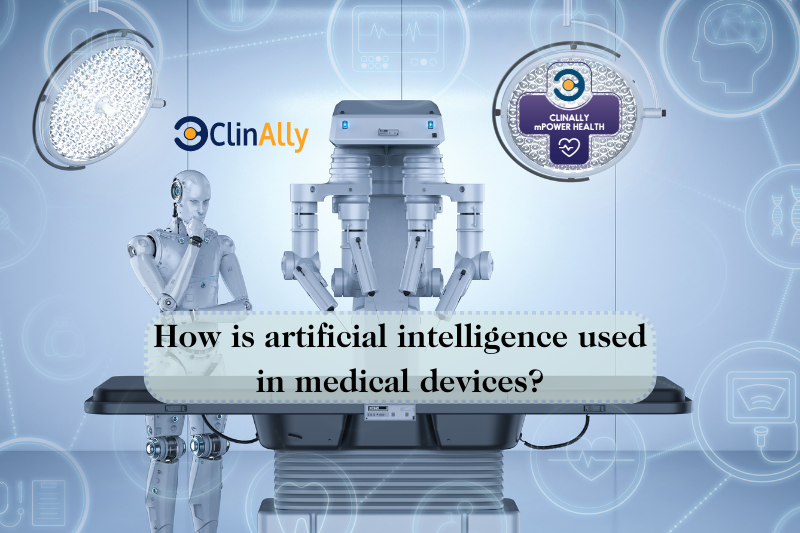How is artificial intelligence used in medical devices? Can a medical diagnosis be made using artificial intelligence?

Artificial Intelligence (AI) is the technology that mimics human activity, decision-making, and learning (1). It is the ability of the machine to make decisions and do tasks that simulate human intelligence and behavior. (2)Today, there is a strong shift in the medical devices industry towards deep learning techniques using neural networks. Neural networks refer to a set of algorithms that are modeled loosely after the human brain and designed to recognize patterns. When exposed to data through neural networks, the deep learning techniques of machines are able to mimic human learning patterns and change without being programmed. (2). With respect to traditional computer programming, AI methods emulate the decision-making process of humans (3).
Globally, regulators like European Council (2017) and Food and Drug Administration (FDA) (2020) have realized the importance of AI to improve healthcare and move away from hospital-centered systems towards integrated care while strengthening health promotion and disease prevention.AI is increasingly used in medicine to help doctors predict diseases and treatment outcomes. They are used for the analysis of medical imaging such as echocardiograms, computed tomography (CT), endoscopy, and skin photographs, to tissue histology and physiological data, such as electrocardiograms (ECG). They are designed to screen for diseases, classify malignancies, and provide personalized treatment recommendations. (4)
Uses of AI
The use of AI in medical devices includes:
- Prediction and identification of diseases (2)
- Data Classification and analysis for disease outbreak (2)
- Optimisation of Medical Therapy (2)
- Diagnostic support Application (2)
- Automate tasks, synthesize data from multiple sources, and pinpoint trends (1)
- Process and analyze information from wearable sensors and identify disease or the onset of medical conditions (1)
- Predict which patients are at an increased risk for disease, complications, or negative outcomes based on their medical records (1)
- Support research by evaluating large amounts of data and monitoring treatment efficacy (1)
- Safer surgeries are performed by AI robots with greater accuracy and success.(5)
As technology advances, medical device companies are developing AI medical devices which serve 3 main functions(1):
- Management of Chronic diseases
- Medical Imaging with better clarity and image quality
- Internet of Things(a system of wireless, interrelated, and connected digital devices used by medical professionals to manage data, keep patients informed, reduce costs and monitor patients)
Artificial Intelligence and Disease Diagnosis
For the diagnosis of a disease, doctors could use technologies such as computed tomography scans (CT scans) or magnetic resonance imaging (MRI) to produce a detailed map of the area that needs to be diagnosed. Later, technology analyses the system-generated image using machine and deep learning models to spot the diseased area’s features in seconds. An artificial intelligence model using machine and deep learning algorithms is initially trained with the help of a particular disease dataset. The dataset is then pre-processed using data cleaning and transformation techniques so that the disease symptoms in the form of feature vectors can be extracted and further diagnosed (6)The best part of implementing AI in healthcare is that it helps to enhance various areas, including illness detection, disease classification, decision-making processes, giving optimal treatment choices, and ultimately, helping people live longer. In terms of disease diagnosis, AI has been thus used to enhance medical diagnosis (6).
Conclusion
With Artificial Intelligence, administrative processes could be improved. All information regarding patient care can be shared using AI-powered technologies. They also improve self-management of diseases since patient gets proper monitoring and suggestions throughout the treatment. The overall cost of treatment is reduced and the speed of treatment is improved. It also improves healthcare accessibility and fastens clinical decision-making. Reduction in prescription errors and other human errors could also be considered an advantage(5). AI is spreading widely throughout the healthcare industry. As AI applications become increasingly integrated with medicine, more and more people will gain access to high-quality, and efficient healthcare(5).
REFERENCES
- https://sterlingmedicaldevices.com/the-use-of-artificial-intelligence-in-medical-devices
- https://www.tuvsud.com/en-in/industries/healthcare-and-medical-devices/artificial-intelligence-in-medical-devices#
- Deo RC. Machine Learning in Medicine. Circulation 2015 Nov17;132(20):1920-1930.
- Badnjević A, Avdihodžić H, GurbetaPokvić L. ARTIFICIAL INTELLIGENCE IN MEDICAL DEVICES: PAST, PRESENT, AND FUTURE. PsychiatrDanub. 2021 May;33(Suppl 3):S336-S341. PMID: 34010259.
- https://atrium.ai/resources/benefits-and-use-cases-of-ai-in-the-medical-device-industry/
- Kumar Y, Koul A, Singla R, Ijaz MF. Artificial intelligence in disease diagnosis: a systematic literature review, synthesizing framework and future research agenda. J Ambient IntellHumanizComput. 2022 Jan 13:1-28. doi: 10.1007/s12652-021-03612-z. Epub ahead of print. PMID: 35039756; PMCID: PMC8754556.
Written by:
Dr. Steena Kuriakose
BDS, PGDE, MPH


